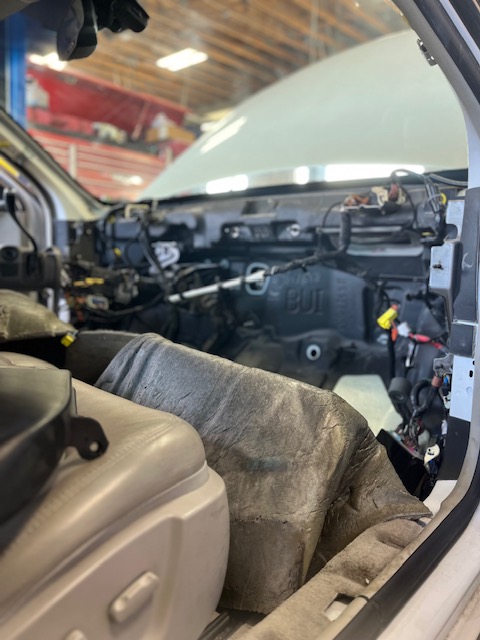Posted on 2/26/2024
.jpeg)
Vehicles are more than just a means of transportation; they are complex machines equipped with advanced technology designed to make our journeys safer, more efficient, and enjoyable. With this complexity comes the need for a sophisticated approach to maintenance and repair, known as auto diagnostics. Understanding Auto Diagnostics Auto diagnostics involve using specialized tools and software to communicate with a vehicle's computer system, which monitors and controls operations such as engine performance, transmission, brakes, and more. When a potential issue arises, the system generates a specific error code, stored until diagnostics are run. This process allows mechanics to quickly identify and address problems, often before they lead to more significant damage or safety concerns. The Role of the Onboard Diagnostic System (OBD) ... read more
Posted on 9/15/2023

What are signs of a leaking heater core? Windows fog up when you turn on the vehicle, coolant on the floorboards, heater not working. A heater core can be a large repair as it is located behind the dash. A heater core is a crucial component of a vehicle's heating and cooling system. It is a small radiator-like device located in the passenger compartment of the vehicle, typically behind the dashboard. The primary purpose of the heater core is to provide heat to the interior of the vehicle by utilizing the engine's coolant system. The heater core consists of a network of small tubes or passages that carry hot coolant from the engine. These tubes are often made of brass or aluminum, which are good conductors of heat. The hot coolant flows through these tubes, and as air passes over the exterior surface of the heater core, the heat is transferred from the tubes to the air. This heated air is then directed into the cabin to warm the interior of the vehicle, providing comfort ... read more
Posted on 7/25/2023

Air Conditioning Is your A/C blowing warm? Where to start? We will start with a visual inspection for any visible leaks, visible damage, determine if compressor is engaging. As long as everything is in working order the refrigerant capacity will need to be checked and verify the system can hold pressure (which will also indicate a leak) At that point the technician would recharge the system to the correct capacity refrigerant and with an ultra violet dye. Air conditioning systems are very temperamental, the refrigerant level must be perfect not too full and not too low. How do you know which refrigerant goes in your vehicle, As of 2015 there are 2 different types of refrigerant, 134a which most vehicles take and 1234yf. These two fluids are not compatible with each other, it is either one or the other the vehicle a/c system label will specify which to use. What symptoms can I watch for to tell if I have low refrigerant? AC blowing warm at all times, blowing warm while dr ... read more
Posted on 5/10/2023

My Vehicle Is Leaking Red Fluid? Have you ever pulled away from where you have been parked for a while and found a puddle right where your car was parked? When puddles of fluid are noticed under your vehicle it’s a pretty good indicator that there is some type of leak going on. All fluids on a vehicle have a color type to help us identify what might be leaking. Red colored fluids are typically found in power steering systems, transmissions, and transfer cases. Today we’re going to discuss how we determine where a leak is coming from and how fluid color can help us locate that leak as well. What Should I Do If I Notice A Fluid Leak? There are multiple systems on a vehicle that require some type of fluid to function normally. When that system leaks all of its fluid out damage can occur. Fluid leaks can be stressful, especially if your experience with cars is limited. If you are fairly familiar with cars a fluid leak is noticed and you know ... read more
Posted on 4/19/2023

Why Is My Car Blowing White Smoke? When vehicles start to blow a visible smoke out of the tail pipe this is usually an indicator of a bigger issue going on with the vehicle. The color of the smoke is also very telling of what type of problem the car is having. White smoke generally means that the vehicle is burning coolant in the combustion chamber. A blue colored smoke is an indicator of oil being burned in the combustion chamber. Today were going to talk about white smoke, and how coolant ends up in the combustion chamber to begin with. How Does Coolant Get Into The Combustion Chamber? Every gasoline powered engine has coolant that circulates through the engine block and radiator to keep the engine cool and operating at a normal temperature. So how does it end up inside the combustion chamber when only fuel and air should be in the cylinder? There are multiple gaskets that keep the coolant sealed off from other areas of the engine compartment. How ... read more